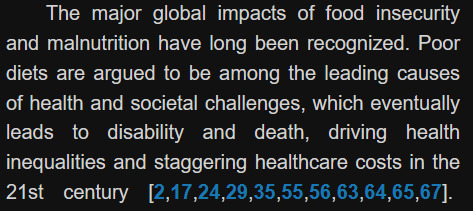#seriously sometimes academia is just about fighting uphill against ludicrous assumptions
Text
"oh scientific papers are so dry" WRONG i have read papers with bleaker, wryer humour than any comedian has put on stage
consider the following paper: Leaving No Child Behind: Decomposing Socioeconomic Inequalities in Child Health for India and South Africa
As the title would suggest, it is about child nutrition in heavily exploited global regions. As such, in addition to dealing with complex social and economic issues, it also has to content with a pervasive web of (often explicitly racist) misconceptions in the public eye.
Therefore, while i cannot speak for the actual intentions of the authors, there is a great deal of bleakly funny wording in here, alongside a vein of bitter, preemptive "I dare you to try raising objections or playing oblivious, this has been pointed out LOTS OF TIMES BEFORE" sentiment throughout.
For instance, after making the point that wealthy families can afford food (and so the issue is more complex than 'this region is poor'), the authors provide eleven citations:

For context, you usually get between one-to-three citations for such a straightforward claim. Five might be excessive. Eleven very much seems like the authors are looking meaningfully at the reader and Making A Point.
Particularly as the similarly uncontroversial idea 'if you don't solve economic inequality you can't solve world hunger' gets twelve citations:

And the fantastically straightforward sentiment of 'your healthcare is fucked up because you won't fund basic welfare' also earns a tidy eleven citations:

Then, a staggering TWENTY citations are laid out for 'seriously, if a household is food-insecure and in a rural area with less-maintained social and material infrastructure, their kids are more likely to suffer from malnutrition':

But, beyond anything else that the authors decided to slap an inarguable number of citations on, the bleakly funniest, tongue-in-cheek message in the entire paper (one that made me genuinely stop and re-read it) was, to paraphrase, 'the problem of malnutrition is not that mothers do not know their children need food'.

Because, yes, there are a non-trivial amount of people that are convinced individual education initiatives are the best way to lift regions of people out of malnutrition and poverty.
As opposed to, like, reliable and sufficient funding for infrastructure and a robust social safety net - and also reducing economic stratification by Actually Redistributing Hoarded Wealth, Jesus Tapdancing Christ.
(Also, you will have to take my word for this but an early pre-edit version of this paper contained the accidental phrase "poor children were less likely to be nutritious", which doubtless led to the rarely seen editors note of "Revised: original sentence implied cannibalism.")
#longpost#nutrition#seriously sometimes academia is just about fighting uphill against ludicrous assumptions#and eventually you learn to get funny with it#you either laugh or you cry
0 notes